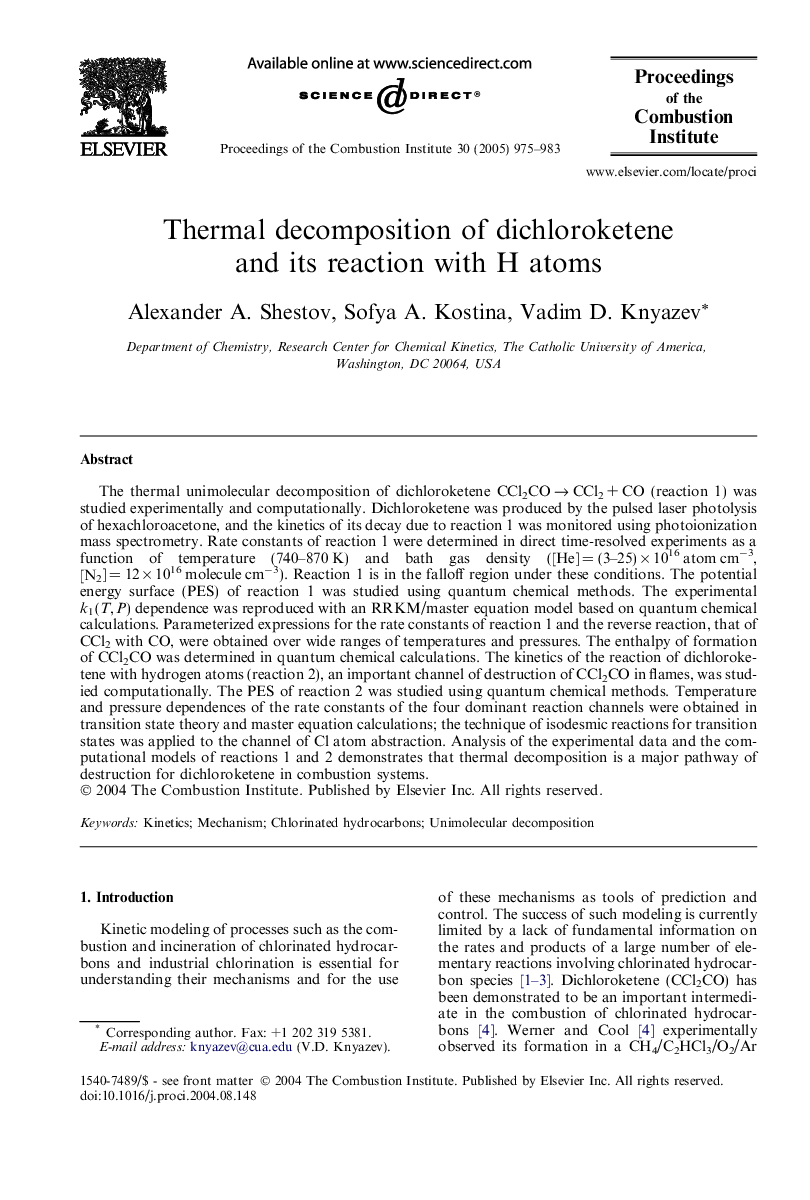| کد مقاله | کد نشریه | سال انتشار | مقاله انگلیسی | نسخه تمام متن |
|---|---|---|---|---|
| 9637425 | 1427931 | 2005 | 9 صفحه PDF | دانلود رایگان |
عنوان انگلیسی مقاله ISI
Thermal decomposition of dichloroketene and its reaction with H atoms
دانلود مقاله + سفارش ترجمه
دانلود مقاله ISI انگلیسی
رایگان برای ایرانیان
کلمات کلیدی
موضوعات مرتبط
مهندسی و علوم پایه
مهندسی شیمی
مهندسی شیمی (عمومی)
پیش نمایش صفحه اول مقاله

چکیده انگلیسی
The thermal unimolecular decomposition of dichloroketene CCl2CO â CCl2 + CO (reaction 1) was studied experimentally and computationally. Dichloroketene was produced by the pulsed laser photolysis of hexachloroacetone, and the kinetics of its decay due to reaction 1 was monitored using photoionization mass spectrometry. Rate constants of reaction 1 were determined in direct time-resolved experiments as a function of temperature (740-870 K) and bath gas density ([He] = (3-25) Ã 1016 atom cmâ3, [N2] = 12 Ã 1016 molecule cmâ3). Reaction 1 is in the falloff region under these conditions. The potential energy surface (PES) of reaction 1 was studied using quantum chemical methods. The experimental k1 (T, P) dependence was reproduced with an RRKM/master equation model based on quantum chemical calculations. Parameterized expressions for the rate constants of reaction 1 and the reverse reaction, that of CCl2 with CO, were obtained over wide ranges of temperatures and pressures. The enthalpy of formation of CCl2CO was determined in quantum chemical calculations. The kinetics of the reaction of dichloroketene with hydrogen atoms (reaction 2), an important channel of destruction of CCl2CO in flames, was studied computationally. The PES of reaction 2 was studied using quantum chemical methods. Temperature and pressure dependences of the rate constants of the four dominant reaction channels were obtained in transition state theory and master equation calculations; the technique of isodesmic reactions for transition states was applied to the channel of Cl atom abstraction. Analysis of the experimental data and the computational models of reactions 1 and 2 demonstrates that thermal decomposition is a major pathway of destruction for dichloroketene in combustion systems.
ناشر
Database: Elsevier - ScienceDirect (ساینس دایرکت)
Journal: Proceedings of the Combustion Institute - Volume 30, Issue 1, January 2005, Pages 975-983
Journal: Proceedings of the Combustion Institute - Volume 30, Issue 1, January 2005, Pages 975-983
نویسندگان
Alexander A. Shestov, Sofya A. Kostina, Vadim D. Knyazev,